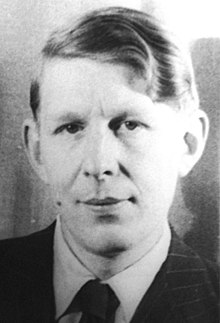
Back W. H. Auden Afrikaans ويستن هيو أودن Arabic ويستن هيو اودن ARZ Wystan Hugh Auden AST Уістан Х’ю Одэн Byelorussian Уистън Хю Одън Bulgarian ডব্লিউ. এইচ. অড্যান Bengali/Bangla Wystan Hugh Auden BS W.H. Auden Catalan Wystan Hugh Auden Czech
W. H. Auden | |
|---|---|
 Auden in 1939 | |
| Born | Wystan Hugh Auden 21 February 1907 York, Yorkshire, England |
| Died | 29 September 1973 (aged 66) Vienna, Austria |
| Occupation | Poet |
| Citizenship |
|
| Education | Christ Church, Oxford (MA) |
| Spouse | |
| Relatives |
|
Wystan Hugh Auden (/ˈwɪstən ˈhjuː ˈɔːdən/; 21 February 1907 – 29 September 1973[1]) was a British-American poet. Auden's poetry is noted for its stylistic and technical achievement, its engagement with politics, morals, love, and religion, and its variety in tone, form, and content. Some of his best known poems are about love, such as "Funeral Blues"; on political and social themes, such as "September 1, 1939" and "The Shield of Achilles"; on cultural and psychological themes, such as The Age of Anxiety; and on religious themes, such as "For the Time Being" and "Horae Canonicae".[2][3][4]
Auden was born in York and grew up in and near Birmingham in a professional, middle-class family. He attended various English independent (or public) schools and studied English at Christ Church, Oxford. After a few months in Berlin in 1928–29, he spent five years (1930–1935) teaching in British private preparatory schools. In 1939, he moved to the United States; he became an American citizen in 1946, retaining his British citizenship. Auden taught from 1941 to 1945 in American universities, followed by occasional visiting professorships in the 1950s.
Auden came to wide public attention in 1930 with his first book, Poems; it was followed in 1932 by The Orators. Three plays written in collaboration with Christopher Isherwood between 1935 and 1938 built his reputation as a left-wing political writer. Auden moved to the United States partly to escape this reputation, and his work in the 1940s, including the long poems "For the Time Being" and "The Sea and the Mirror", focused on religious themes. He won the Pulitzer Prize for Poetry for his 1947 long poem The Age of Anxiety, the title of which became a popular phrase describing the modern era.[5] From 1956 to 1961, he was Professor of Poetry at Oxford; his lectures were popular with students and faculty and served as the basis for his 1962 prose collection The Dyer's Hand.
Auden was a prolific writer of prose essays and reviews on literary, political, psychological, and religious subjects, and he worked at various times on documentary films, poetic plays, and other forms of performance. Throughout his career he was both controversial and influential. Critical views on his work ranged from sharply dismissive (treating him as a lesser figure than W. B. Yeats and T. S. Eliot) to strongly affirmative (as in Joseph Brodsky's statement that he had "the greatest mind of the twentieth century"). After his death, his poems became known to a much wider public through films, broadcasts, and popular media.
- ^ The date on the death certificate; the 28 September date on his grave was an error.
- ^ Auden, W. H. (2002). Mendelson, Edward (ed.). Prose, Volume II: 1939–1948. Princeton: Princeton University Press. p. 478. ISBN 978-0-691-08935-5. Auden used the phrase "Anglo-American Poets" in 1943, implicitly referring to himself and T. S. Eliot.
- ^ The first definition of "Anglo-American" in the OED (2008 revision) is: "Of, belonging to, or involving both England (or Britain) and America.""Oxford English Dictionary (access by subscription)". Retrieved 25 May 2009. See also the definition "English in origin or birth, American by settlement or citizenship" in Chambers 20th Century Dictionary. 1969. p. 45. See also the definition "an American, especially a citizen of the United States, of English origin or descent" in Merriam Webster's New International Dictionary, Second Edition. 1969. p. 103. See also the definition "a native or descendant of a native of England who has settled in or become a citizen of America, esp. of the United States" from The Random House Dictionary, 2009, available online at "Dictionary.com". Archived from the original on 4 March 2016. Retrieved 25 May 2009.
- ^ Smith, Stan, ed. (2004). The Cambridge Companion to W. H. Auden. Cambridge: Cambridge University Press. ISBN 978-0-521-82962-5.
- ^ Cite error: The named reference
RDH-NoPagewas invoked but never defined (see the help page).